Travel and Tourism Sector Analysis: Economic and Political Impacts
VerifiedAdded on 2020/01/07
|12
|4015
|196
Report
AI Summary
This report provides a comprehensive analysis of the travel and tourism sector, beginning with a historical overview of its development, including pre-1945, the post-war period (1945-1979), and the modern era (1980-present), highlighting the influence of technology and transportation. It then examin...
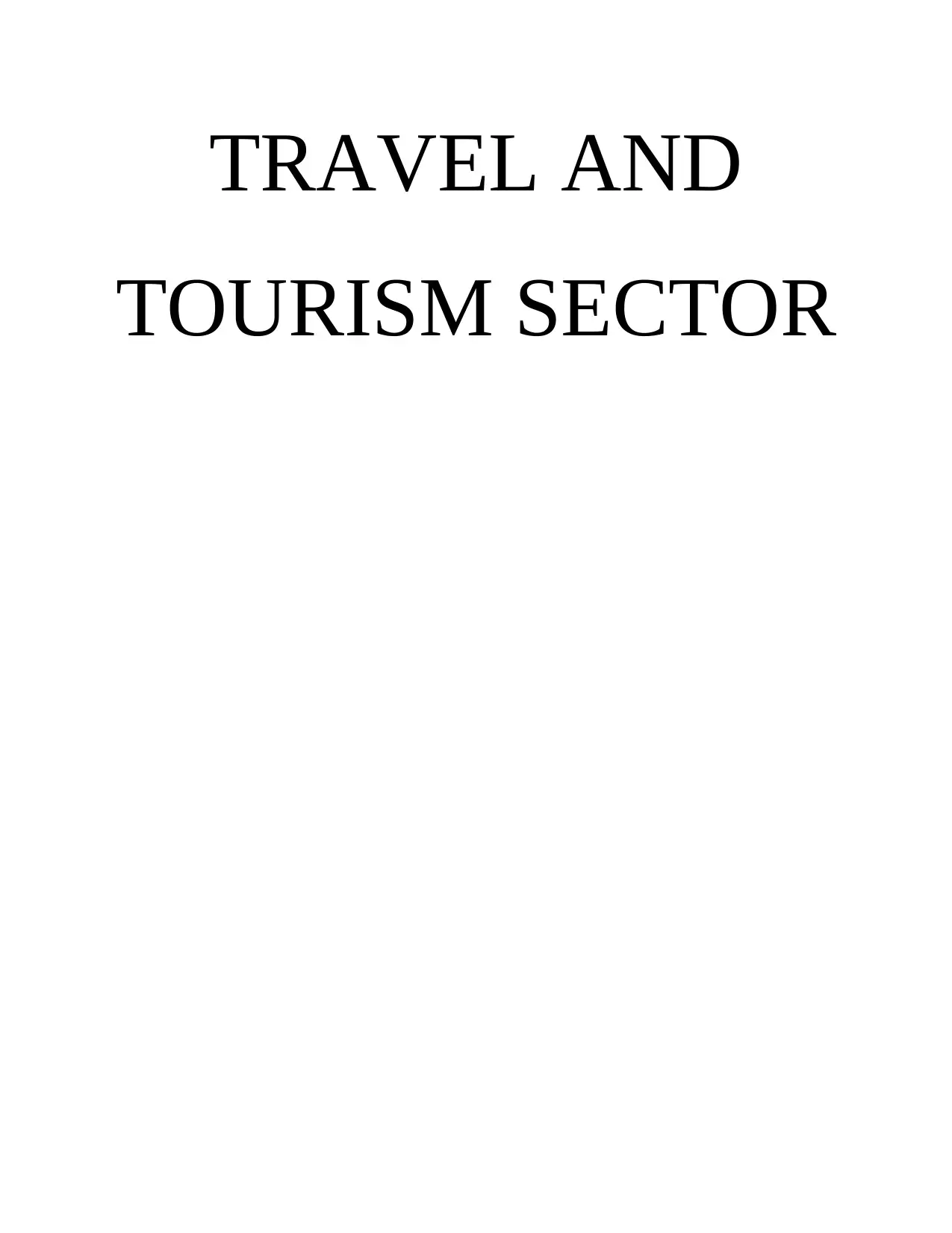
TRAVEL AND
TOURISM SECTOR
TOURISM SECTOR
Paraphrase This Document
Need a fresh take? Get an instant paraphrase of this document with our AI Paraphraser
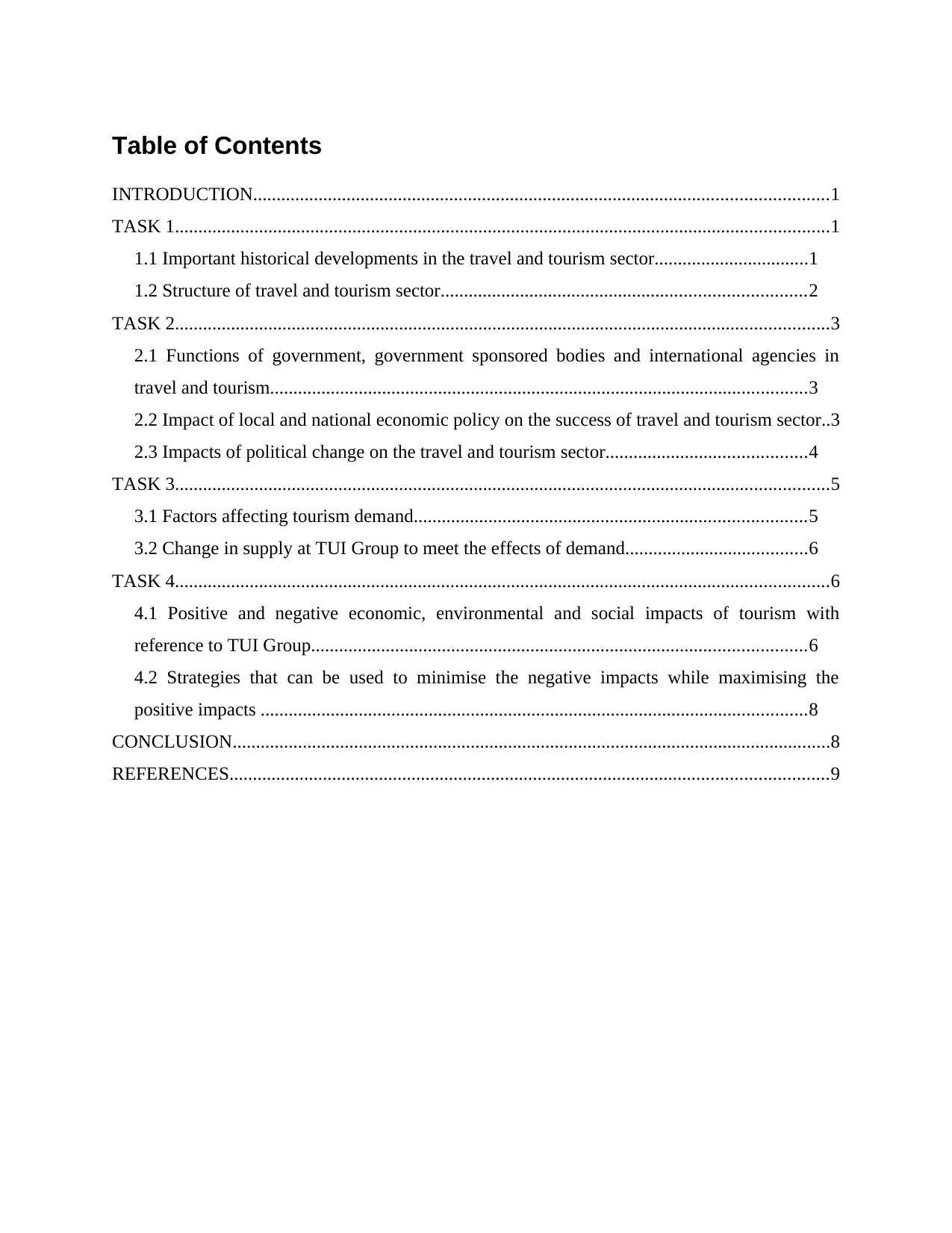
Table of Contents
INTRODUCTION...........................................................................................................................1
TASK 1............................................................................................................................................1
1.1 Important historical developments in the travel and tourism sector.................................1
1.2 Structure of travel and tourism sector..............................................................................2
TASK 2............................................................................................................................................3
2.1 Functions of government, government sponsored bodies and international agencies in
travel and tourism...................................................................................................................3
2.2 Impact of local and national economic policy on the success of travel and tourism sector..3
2.3 Impacts of political change on the travel and tourism sector...........................................4
TASK 3............................................................................................................................................5
3.1 Factors affecting tourism demand....................................................................................5
3.2 Change in supply at TUI Group to meet the effects of demand.......................................6
TASK 4............................................................................................................................................6
4.1 Positive and negative economic, environmental and social impacts of tourism with
reference to TUI Group..........................................................................................................6
4.2 Strategies that can be used to minimise the negative impacts while maximising the
positive impacts .....................................................................................................................8
CONCLUSION................................................................................................................................8
REFERENCES................................................................................................................................9
INTRODUCTION...........................................................................................................................1
TASK 1............................................................................................................................................1
1.1 Important historical developments in the travel and tourism sector.................................1
1.2 Structure of travel and tourism sector..............................................................................2
TASK 2............................................................................................................................................3
2.1 Functions of government, government sponsored bodies and international agencies in
travel and tourism...................................................................................................................3
2.2 Impact of local and national economic policy on the success of travel and tourism sector..3
2.3 Impacts of political change on the travel and tourism sector...........................................4
TASK 3............................................................................................................................................5
3.1 Factors affecting tourism demand....................................................................................5
3.2 Change in supply at TUI Group to meet the effects of demand.......................................6
TASK 4............................................................................................................................................6
4.1 Positive and negative economic, environmental and social impacts of tourism with
reference to TUI Group..........................................................................................................6
4.2 Strategies that can be used to minimise the negative impacts while maximising the
positive impacts .....................................................................................................................8
CONCLUSION................................................................................................................................8
REFERENCES................................................................................................................................9
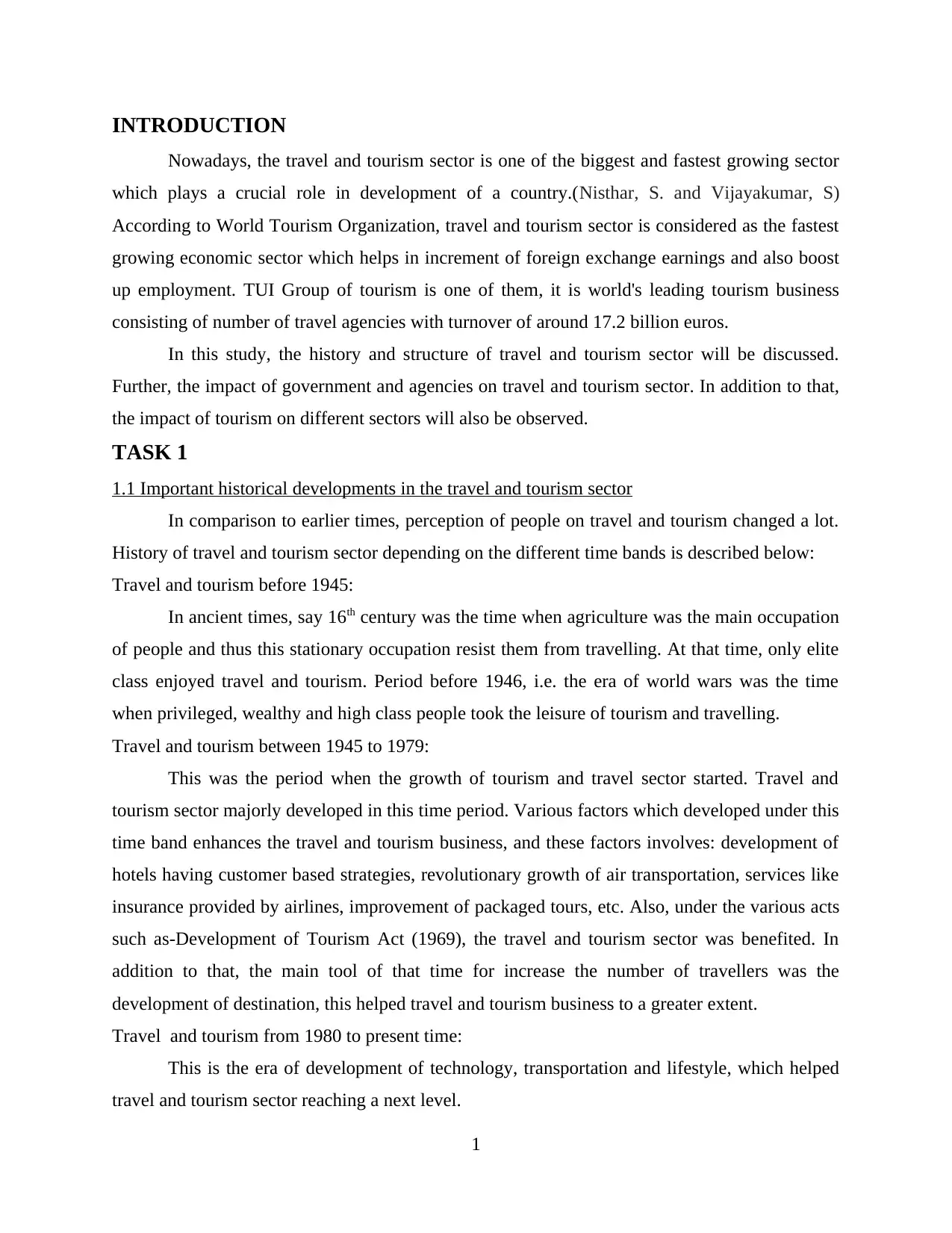
INTRODUCTION
Nowadays, the travel and tourism sector is one of the biggest and fastest growing sector
which plays a crucial role in development of a country.(Nisthar, S. and Vijayakumar, S)
According to World Tourism Organization, travel and tourism sector is considered as the fastest
growing economic sector which helps in increment of foreign exchange earnings and also boost
up employment. TUI Group of tourism is one of them, it is world's leading tourism business
consisting of number of travel agencies with turnover of around 17.2 billion euros.
In this study, the history and structure of travel and tourism sector will be discussed.
Further, the impact of government and agencies on travel and tourism sector. In addition to that,
the impact of tourism on different sectors will also be observed.
TASK 1
1.1 Important historical developments in the travel and tourism sector
In comparison to earlier times, perception of people on travel and tourism changed a lot.
History of travel and tourism sector depending on the different time bands is described below:
Travel and tourism before 1945:
In ancient times, say 16th century was the time when agriculture was the main occupation
of people and thus this stationary occupation resist them from travelling. At that time, only elite
class enjoyed travel and tourism. Period before 1946, i.e. the era of world wars was the time
when privileged, wealthy and high class people took the leisure of tourism and travelling.
Travel and tourism between 1945 to 1979:
This was the period when the growth of tourism and travel sector started. Travel and
tourism sector majorly developed in this time period. Various factors which developed under this
time band enhances the travel and tourism business, and these factors involves: development of
hotels having customer based strategies, revolutionary growth of air transportation, services like
insurance provided by airlines, improvement of packaged tours, etc. Also, under the various acts
such as-Development of Tourism Act (1969), the travel and tourism sector was benefited. In
addition to that, the main tool of that time for increase the number of travellers was the
development of destination, this helped travel and tourism business to a greater extent.
Travel and tourism from 1980 to present time:
This is the era of development of technology, transportation and lifestyle, which helped
travel and tourism sector reaching a next level.
1
Nowadays, the travel and tourism sector is one of the biggest and fastest growing sector
which plays a crucial role in development of a country.(Nisthar, S. and Vijayakumar, S)
According to World Tourism Organization, travel and tourism sector is considered as the fastest
growing economic sector which helps in increment of foreign exchange earnings and also boost
up employment. TUI Group of tourism is one of them, it is world's leading tourism business
consisting of number of travel agencies with turnover of around 17.2 billion euros.
In this study, the history and structure of travel and tourism sector will be discussed.
Further, the impact of government and agencies on travel and tourism sector. In addition to that,
the impact of tourism on different sectors will also be observed.
TASK 1
1.1 Important historical developments in the travel and tourism sector
In comparison to earlier times, perception of people on travel and tourism changed a lot.
History of travel and tourism sector depending on the different time bands is described below:
Travel and tourism before 1945:
In ancient times, say 16th century was the time when agriculture was the main occupation
of people and thus this stationary occupation resist them from travelling. At that time, only elite
class enjoyed travel and tourism. Period before 1946, i.e. the era of world wars was the time
when privileged, wealthy and high class people took the leisure of tourism and travelling.
Travel and tourism between 1945 to 1979:
This was the period when the growth of tourism and travel sector started. Travel and
tourism sector majorly developed in this time period. Various factors which developed under this
time band enhances the travel and tourism business, and these factors involves: development of
hotels having customer based strategies, revolutionary growth of air transportation, services like
insurance provided by airlines, improvement of packaged tours, etc. Also, under the various acts
such as-Development of Tourism Act (1969), the travel and tourism sector was benefited. In
addition to that, the main tool of that time for increase the number of travellers was the
development of destination, this helped travel and tourism business to a greater extent.
Travel and tourism from 1980 to present time:
This is the era of development of technology, transportation and lifestyle, which helped
travel and tourism sector reaching a next level.
1
You're viewing a preview
Unlock full access by subscribing today!
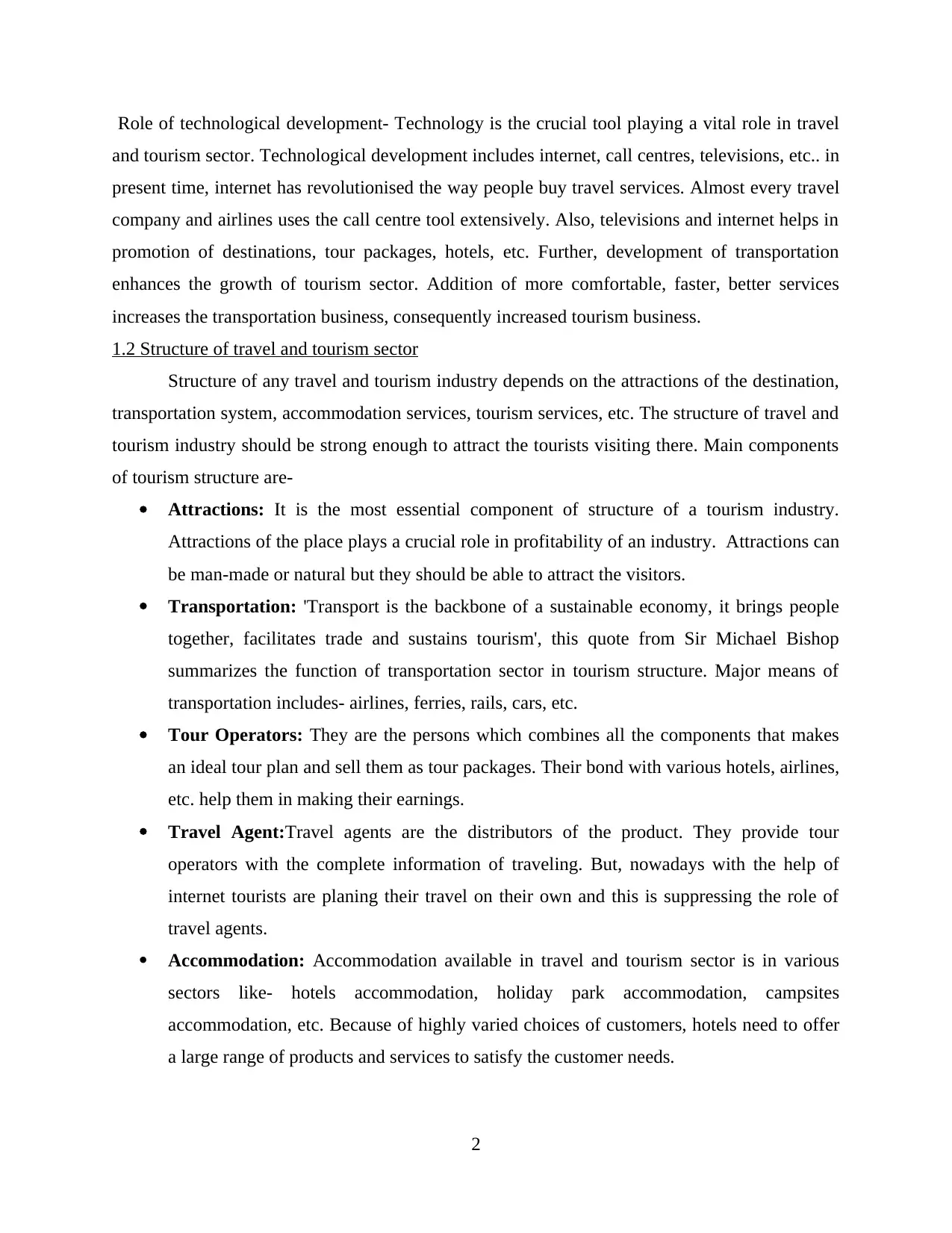
Role of technological development- Technology is the crucial tool playing a vital role in travel
and tourism sector. Technological development includes internet, call centres, televisions, etc.. in
present time, internet has revolutionised the way people buy travel services. Almost every travel
company and airlines uses the call centre tool extensively. Also, televisions and internet helps in
promotion of destinations, tour packages, hotels, etc. Further, development of transportation
enhances the growth of tourism sector. Addition of more comfortable, faster, better services
increases the transportation business, consequently increased tourism business.
1.2 Structure of travel and tourism sector
Structure of any travel and tourism industry depends on the attractions of the destination,
transportation system, accommodation services, tourism services, etc. The structure of travel and
tourism industry should be strong enough to attract the tourists visiting there. Main components
of tourism structure are-
Attractions: It is the most essential component of structure of a tourism industry.
Attractions of the place plays a crucial role in profitability of an industry. Attractions can
be man-made or natural but they should be able to attract the visitors.
Transportation: 'Transport is the backbone of a sustainable economy, it brings people
together, facilitates trade and sustains tourism', this quote from Sir Michael Bishop
summarizes the function of transportation sector in tourism structure. Major means of
transportation includes- airlines, ferries, rails, cars, etc.
Tour Operators: They are the persons which combines all the components that makes
an ideal tour plan and sell them as tour packages. Their bond with various hotels, airlines,
etc. help them in making their earnings.
Travel Agent:Travel agents are the distributors of the product. They provide tour
operators with the complete information of traveling. But, nowadays with the help of
internet tourists are planing their travel on their own and this is suppressing the role of
travel agents.
Accommodation: Accommodation available in travel and tourism sector is in various
sectors like- hotels accommodation, holiday park accommodation, campsites
accommodation, etc. Because of highly varied choices of customers, hotels need to offer
a large range of products and services to satisfy the customer needs.
2
and tourism sector. Technological development includes internet, call centres, televisions, etc.. in
present time, internet has revolutionised the way people buy travel services. Almost every travel
company and airlines uses the call centre tool extensively. Also, televisions and internet helps in
promotion of destinations, tour packages, hotels, etc. Further, development of transportation
enhances the growth of tourism sector. Addition of more comfortable, faster, better services
increases the transportation business, consequently increased tourism business.
1.2 Structure of travel and tourism sector
Structure of any travel and tourism industry depends on the attractions of the destination,
transportation system, accommodation services, tourism services, etc. The structure of travel and
tourism industry should be strong enough to attract the tourists visiting there. Main components
of tourism structure are-
Attractions: It is the most essential component of structure of a tourism industry.
Attractions of the place plays a crucial role in profitability of an industry. Attractions can
be man-made or natural but they should be able to attract the visitors.
Transportation: 'Transport is the backbone of a sustainable economy, it brings people
together, facilitates trade and sustains tourism', this quote from Sir Michael Bishop
summarizes the function of transportation sector in tourism structure. Major means of
transportation includes- airlines, ferries, rails, cars, etc.
Tour Operators: They are the persons which combines all the components that makes
an ideal tour plan and sell them as tour packages. Their bond with various hotels, airlines,
etc. help them in making their earnings.
Travel Agent:Travel agents are the distributors of the product. They provide tour
operators with the complete information of traveling. But, nowadays with the help of
internet tourists are planing their travel on their own and this is suppressing the role of
travel agents.
Accommodation: Accommodation available in travel and tourism sector is in various
sectors like- hotels accommodation, holiday park accommodation, campsites
accommodation, etc. Because of highly varied choices of customers, hotels need to offer
a large range of products and services to satisfy the customer needs.
2
Paraphrase This Document
Need a fresh take? Get an instant paraphrase of this document with our AI Paraphraser
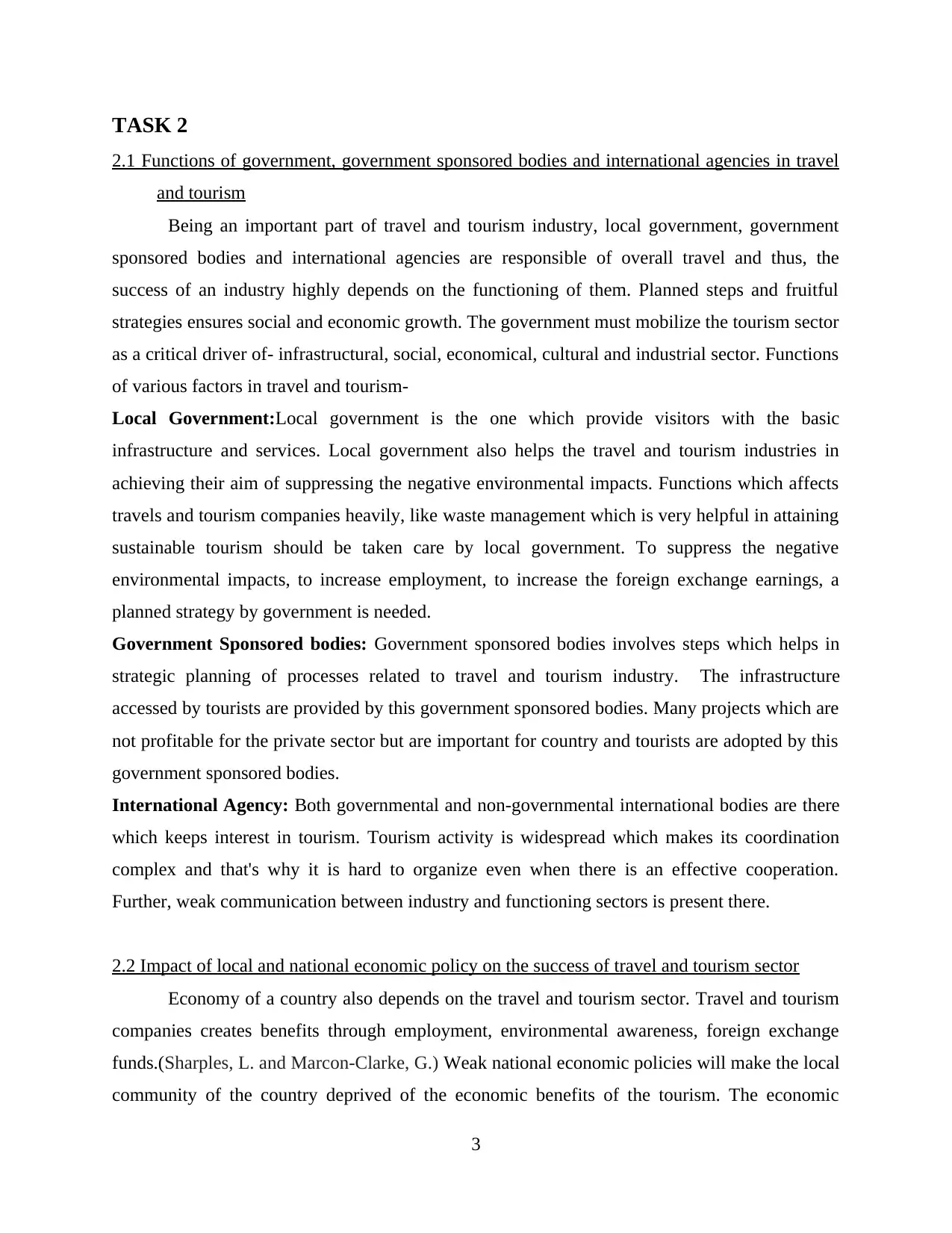
TASK 2
2.1 Functions of government, government sponsored bodies and international agencies in travel
and tourism
Being an important part of travel and tourism industry, local government, government
sponsored bodies and international agencies are responsible of overall travel and thus, the
success of an industry highly depends on the functioning of them. Planned steps and fruitful
strategies ensures social and economic growth. The government must mobilize the tourism sector
as a critical driver of- infrastructural, social, economical, cultural and industrial sector. Functions
of various factors in travel and tourism-
Local Government:Local government is the one which provide visitors with the basic
infrastructure and services. Local government also helps the travel and tourism industries in
achieving their aim of suppressing the negative environmental impacts. Functions which affects
travels and tourism companies heavily, like waste management which is very helpful in attaining
sustainable tourism should be taken care by local government. To suppress the negative
environmental impacts, to increase employment, to increase the foreign exchange earnings, a
planned strategy by government is needed.
Government Sponsored bodies: Government sponsored bodies involves steps which helps in
strategic planning of processes related to travel and tourism industry. The infrastructure
accessed by tourists are provided by this government sponsored bodies. Many projects which are
not profitable for the private sector but are important for country and tourists are adopted by this
government sponsored bodies.
International Agency: Both governmental and non-governmental international bodies are there
which keeps interest in tourism. Tourism activity is widespread which makes its coordination
complex and that's why it is hard to organize even when there is an effective cooperation.
Further, weak communication between industry and functioning sectors is present there.
2.2 Impact of local and national economic policy on the success of travel and tourism sector
Economy of a country also depends on the travel and tourism sector. Travel and tourism
companies creates benefits through employment, environmental awareness, foreign exchange
funds.(Sharples, L. and Marcon-Clarke, G.) Weak national economic policies will make the local
community of the country deprived of the economic benefits of the tourism. The economic
3
2.1 Functions of government, government sponsored bodies and international agencies in travel
and tourism
Being an important part of travel and tourism industry, local government, government
sponsored bodies and international agencies are responsible of overall travel and thus, the
success of an industry highly depends on the functioning of them. Planned steps and fruitful
strategies ensures social and economic growth. The government must mobilize the tourism sector
as a critical driver of- infrastructural, social, economical, cultural and industrial sector. Functions
of various factors in travel and tourism-
Local Government:Local government is the one which provide visitors with the basic
infrastructure and services. Local government also helps the travel and tourism industries in
achieving their aim of suppressing the negative environmental impacts. Functions which affects
travels and tourism companies heavily, like waste management which is very helpful in attaining
sustainable tourism should be taken care by local government. To suppress the negative
environmental impacts, to increase employment, to increase the foreign exchange earnings, a
planned strategy by government is needed.
Government Sponsored bodies: Government sponsored bodies involves steps which helps in
strategic planning of processes related to travel and tourism industry. The infrastructure
accessed by tourists are provided by this government sponsored bodies. Many projects which are
not profitable for the private sector but are important for country and tourists are adopted by this
government sponsored bodies.
International Agency: Both governmental and non-governmental international bodies are there
which keeps interest in tourism. Tourism activity is widespread which makes its coordination
complex and that's why it is hard to organize even when there is an effective cooperation.
Further, weak communication between industry and functioning sectors is present there.
2.2 Impact of local and national economic policy on the success of travel and tourism sector
Economy of a country also depends on the travel and tourism sector. Travel and tourism
companies creates benefits through employment, environmental awareness, foreign exchange
funds.(Sharples, L. and Marcon-Clarke, G.) Weak national economic policies will make the local
community of the country deprived of the economic benefits of the tourism. The economic
3
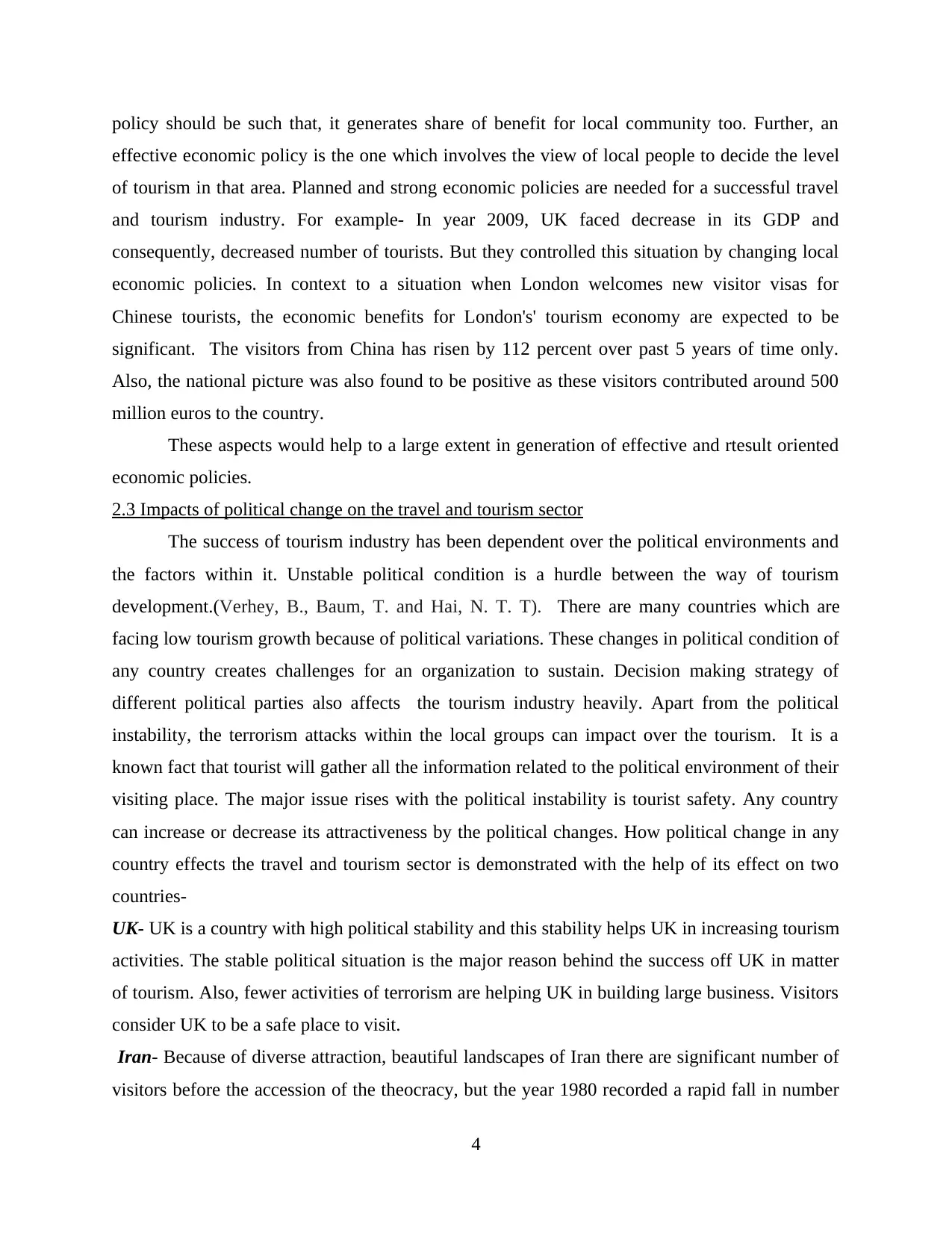
policy should be such that, it generates share of benefit for local community too. Further, an
effective economic policy is the one which involves the view of local people to decide the level
of tourism in that area. Planned and strong economic policies are needed for a successful travel
and tourism industry. For example- In year 2009, UK faced decrease in its GDP and
consequently, decreased number of tourists. But they controlled this situation by changing local
economic policies. In context to a situation when London welcomes new visitor visas for
Chinese tourists, the economic benefits for London's' tourism economy are expected to be
significant. The visitors from China has risen by 112 percent over past 5 years of time only.
Also, the national picture was also found to be positive as these visitors contributed around 500
million euros to the country.
These aspects would help to a large extent in generation of effective and rtesult oriented
economic policies.
2.3 Impacts of political change on the travel and tourism sector
The success of tourism industry has been dependent over the political environments and
the factors within it. Unstable political condition is a hurdle between the way of tourism
development.(Verhey, B., Baum, T. and Hai, N. T. T). There are many countries which are
facing low tourism growth because of political variations. These changes in political condition of
any country creates challenges for an organization to sustain. Decision making strategy of
different political parties also affects the tourism industry heavily. Apart from the political
instability, the terrorism attacks within the local groups can impact over the tourism. It is a
known fact that tourist will gather all the information related to the political environment of their
visiting place. The major issue rises with the political instability is tourist safety. Any country
can increase or decrease its attractiveness by the political changes. How political change in any
country effects the travel and tourism sector is demonstrated with the help of its effect on two
countries-
UK- UK is a country with high political stability and this stability helps UK in increasing tourism
activities. The stable political situation is the major reason behind the success off UK in matter
of tourism. Also, fewer activities of terrorism are helping UK in building large business. Visitors
consider UK to be a safe place to visit.
Iran- Because of diverse attraction, beautiful landscapes of Iran there are significant number of
visitors before the accession of the theocracy, but the year 1980 recorded a rapid fall in number
4
effective economic policy is the one which involves the view of local people to decide the level
of tourism in that area. Planned and strong economic policies are needed for a successful travel
and tourism industry. For example- In year 2009, UK faced decrease in its GDP and
consequently, decreased number of tourists. But they controlled this situation by changing local
economic policies. In context to a situation when London welcomes new visitor visas for
Chinese tourists, the economic benefits for London's' tourism economy are expected to be
significant. The visitors from China has risen by 112 percent over past 5 years of time only.
Also, the national picture was also found to be positive as these visitors contributed around 500
million euros to the country.
These aspects would help to a large extent in generation of effective and rtesult oriented
economic policies.
2.3 Impacts of political change on the travel and tourism sector
The success of tourism industry has been dependent over the political environments and
the factors within it. Unstable political condition is a hurdle between the way of tourism
development.(Verhey, B., Baum, T. and Hai, N. T. T). There are many countries which are
facing low tourism growth because of political variations. These changes in political condition of
any country creates challenges for an organization to sustain. Decision making strategy of
different political parties also affects the tourism industry heavily. Apart from the political
instability, the terrorism attacks within the local groups can impact over the tourism. It is a
known fact that tourist will gather all the information related to the political environment of their
visiting place. The major issue rises with the political instability is tourist safety. Any country
can increase or decrease its attractiveness by the political changes. How political change in any
country effects the travel and tourism sector is demonstrated with the help of its effect on two
countries-
UK- UK is a country with high political stability and this stability helps UK in increasing tourism
activities. The stable political situation is the major reason behind the success off UK in matter
of tourism. Also, fewer activities of terrorism are helping UK in building large business. Visitors
consider UK to be a safe place to visit.
Iran- Because of diverse attraction, beautiful landscapes of Iran there are significant number of
visitors before the accession of the theocracy, but the year 1980 recorded a rapid fall in number
4
You're viewing a preview
Unlock full access by subscribing today!
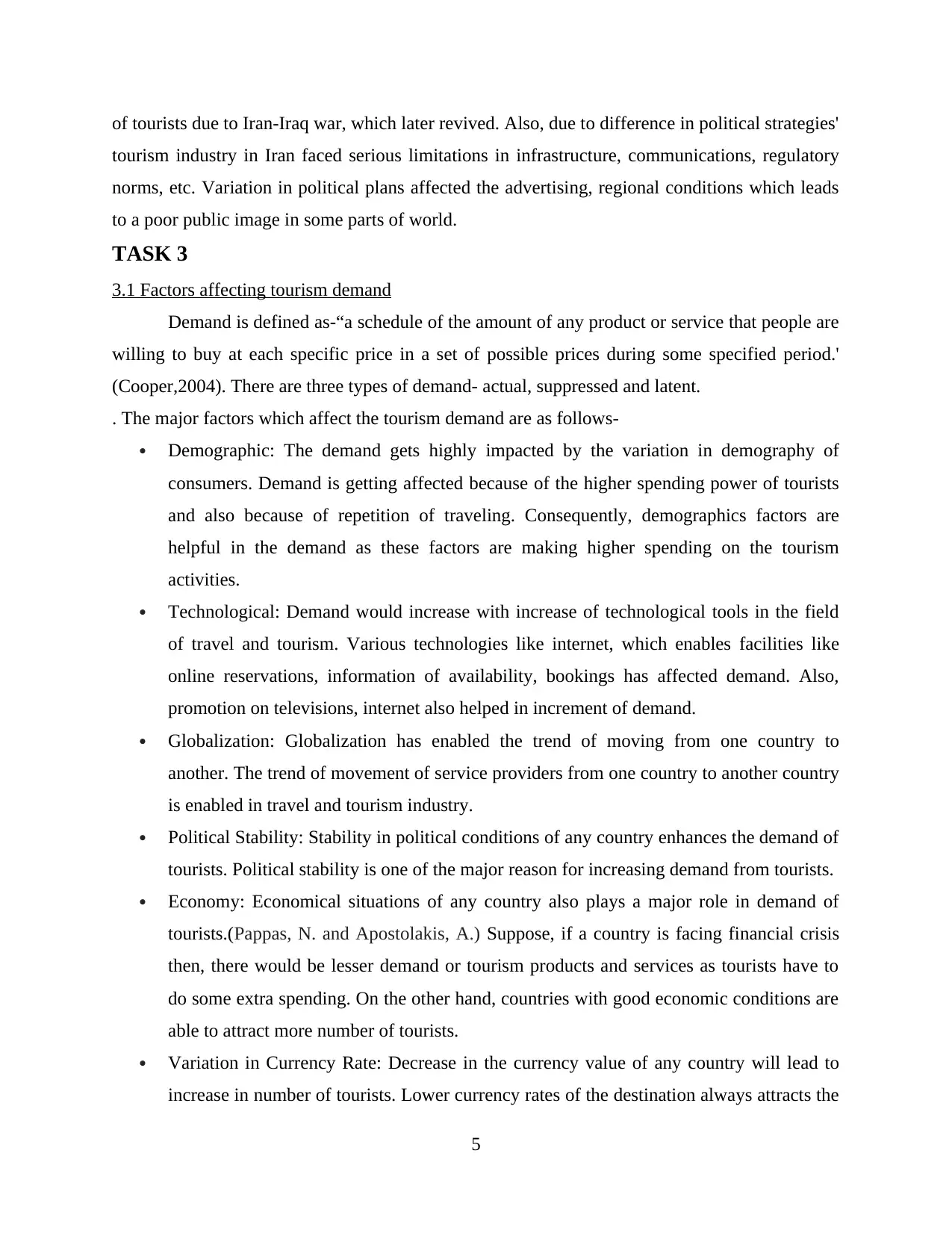
of tourists due to Iran-Iraq war, which later revived. Also, due to difference in political strategies'
tourism industry in Iran faced serious limitations in infrastructure, communications, regulatory
norms, etc. Variation in political plans affected the advertising, regional conditions which leads
to a poor public image in some parts of world.
TASK 3
3.1 Factors affecting tourism demand
Demand is defined as-“a schedule of the amount of any product or service that people are
willing to buy at each specific price in a set of possible prices during some specified period.'
(Cooper,2004). There are three types of demand- actual, suppressed and latent.
. The major factors which affect the tourism demand are as follows-
Demographic: The demand gets highly impacted by the variation in demography of
consumers. Demand is getting affected because of the higher spending power of tourists
and also because of repetition of traveling. Consequently, demographics factors are
helpful in the demand as these factors are making higher spending on the tourism
activities.
Technological: Demand would increase with increase of technological tools in the field
of travel and tourism. Various technologies like internet, which enables facilities like
online reservations, information of availability, bookings has affected demand. Also,
promotion on televisions, internet also helped in increment of demand.
Globalization: Globalization has enabled the trend of moving from one country to
another. The trend of movement of service providers from one country to another country
is enabled in travel and tourism industry.
Political Stability: Stability in political conditions of any country enhances the demand of
tourists. Political stability is one of the major reason for increasing demand from tourists.
Economy: Economical situations of any country also plays a major role in demand of
tourists.(Pappas, N. and Apostolakis, A.) Suppose, if a country is facing financial crisis
then, there would be lesser demand or tourism products and services as tourists have to
do some extra spending. On the other hand, countries with good economic conditions are
able to attract more number of tourists.
Variation in Currency Rate: Decrease in the currency value of any country will lead to
increase in number of tourists. Lower currency rates of the destination always attracts the
5
tourism industry in Iran faced serious limitations in infrastructure, communications, regulatory
norms, etc. Variation in political plans affected the advertising, regional conditions which leads
to a poor public image in some parts of world.
TASK 3
3.1 Factors affecting tourism demand
Demand is defined as-“a schedule of the amount of any product or service that people are
willing to buy at each specific price in a set of possible prices during some specified period.'
(Cooper,2004). There are three types of demand- actual, suppressed and latent.
. The major factors which affect the tourism demand are as follows-
Demographic: The demand gets highly impacted by the variation in demography of
consumers. Demand is getting affected because of the higher spending power of tourists
and also because of repetition of traveling. Consequently, demographics factors are
helpful in the demand as these factors are making higher spending on the tourism
activities.
Technological: Demand would increase with increase of technological tools in the field
of travel and tourism. Various technologies like internet, which enables facilities like
online reservations, information of availability, bookings has affected demand. Also,
promotion on televisions, internet also helped in increment of demand.
Globalization: Globalization has enabled the trend of moving from one country to
another. The trend of movement of service providers from one country to another country
is enabled in travel and tourism industry.
Political Stability: Stability in political conditions of any country enhances the demand of
tourists. Political stability is one of the major reason for increasing demand from tourists.
Economy: Economical situations of any country also plays a major role in demand of
tourists.(Pappas, N. and Apostolakis, A.) Suppose, if a country is facing financial crisis
then, there would be lesser demand or tourism products and services as tourists have to
do some extra spending. On the other hand, countries with good economic conditions are
able to attract more number of tourists.
Variation in Currency Rate: Decrease in the currency value of any country will lead to
increase in number of tourists. Lower currency rates of the destination always attracts the
5
Paraphrase This Document
Need a fresh take? Get an instant paraphrase of this document with our AI Paraphraser
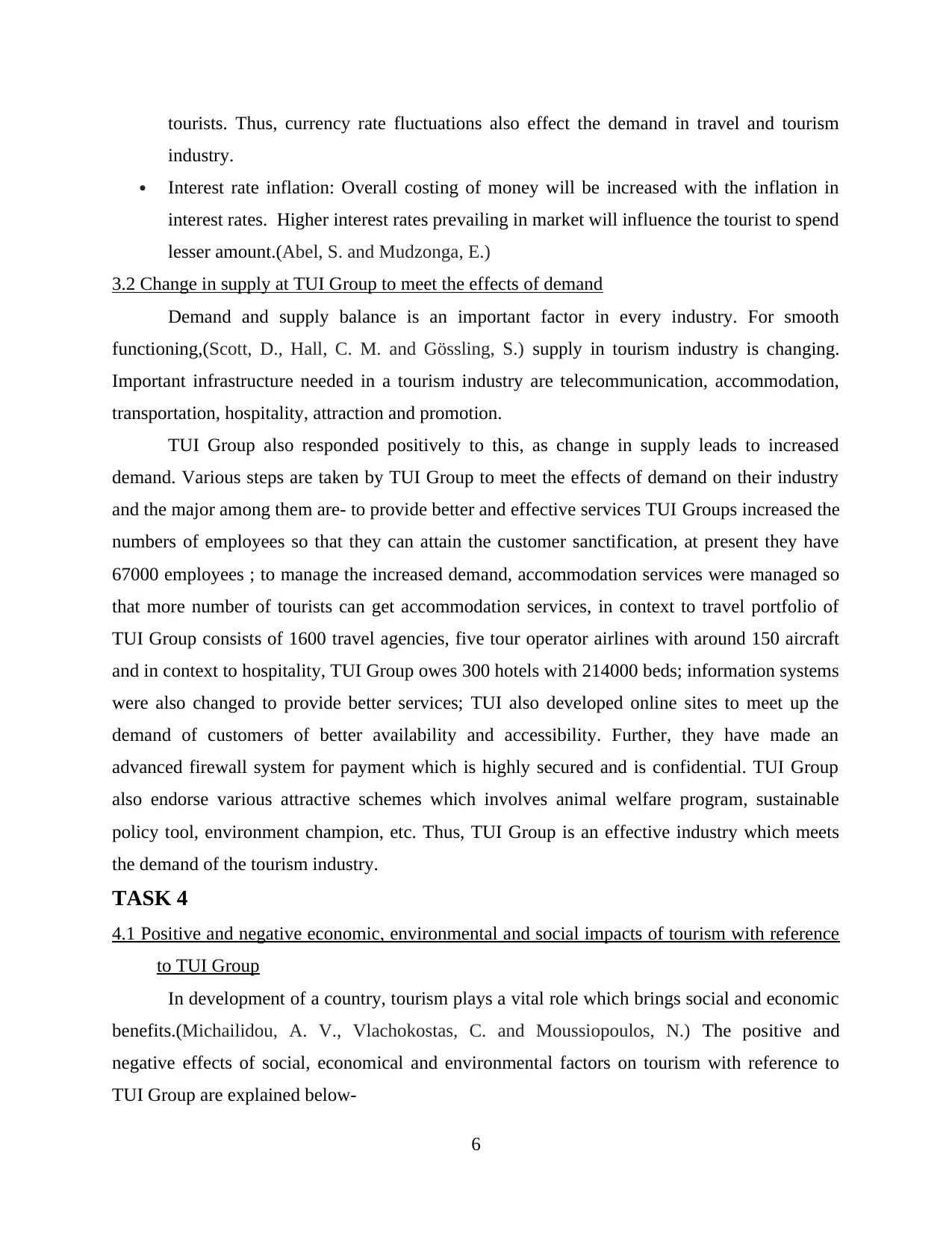
tourists. Thus, currency rate fluctuations also effect the demand in travel and tourism
industry.
Interest rate inflation: Overall costing of money will be increased with the inflation in
interest rates. Higher interest rates prevailing in market will influence the tourist to spend
lesser amount.(Abel, S. and Mudzonga, E.)
3.2 Change in supply at TUI Group to meet the effects of demand
Demand and supply balance is an important factor in every industry. For smooth
functioning,(Scott, D., Hall, C. M. and Gössling, S.) supply in tourism industry is changing.
Important infrastructure needed in a tourism industry are telecommunication, accommodation,
transportation, hospitality, attraction and promotion.
TUI Group also responded positively to this, as change in supply leads to increased
demand. Various steps are taken by TUI Group to meet the effects of demand on their industry
and the major among them are- to provide better and effective services TUI Groups increased the
numbers of employees so that they can attain the customer sanctification, at present they have
67000 employees ; to manage the increased demand, accommodation services were managed so
that more number of tourists can get accommodation services, in context to travel portfolio of
TUI Group consists of 1600 travel agencies, five tour operator airlines with around 150 aircraft
and in context to hospitality, TUI Group owes 300 hotels with 214000 beds; information systems
were also changed to provide better services; TUI also developed online sites to meet up the
demand of customers of better availability and accessibility. Further, they have made an
advanced firewall system for payment which is highly secured and is confidential. TUI Group
also endorse various attractive schemes which involves animal welfare program, sustainable
policy tool, environment champion, etc. Thus, TUI Group is an effective industry which meets
the demand of the tourism industry.
TASK 4
4.1 Positive and negative economic, environmental and social impacts of tourism with reference
to TUI Group
In development of a country, tourism plays a vital role which brings social and economic
benefits.(Michailidou, A. V., Vlachokostas, C. and Moussiopoulos, Ν.) The positive and
negative effects of social, economical and environmental factors on tourism with reference to
TUI Group are explained below-
6
industry.
Interest rate inflation: Overall costing of money will be increased with the inflation in
interest rates. Higher interest rates prevailing in market will influence the tourist to spend
lesser amount.(Abel, S. and Mudzonga, E.)
3.2 Change in supply at TUI Group to meet the effects of demand
Demand and supply balance is an important factor in every industry. For smooth
functioning,(Scott, D., Hall, C. M. and Gössling, S.) supply in tourism industry is changing.
Important infrastructure needed in a tourism industry are telecommunication, accommodation,
transportation, hospitality, attraction and promotion.
TUI Group also responded positively to this, as change in supply leads to increased
demand. Various steps are taken by TUI Group to meet the effects of demand on their industry
and the major among them are- to provide better and effective services TUI Groups increased the
numbers of employees so that they can attain the customer sanctification, at present they have
67000 employees ; to manage the increased demand, accommodation services were managed so
that more number of tourists can get accommodation services, in context to travel portfolio of
TUI Group consists of 1600 travel agencies, five tour operator airlines with around 150 aircraft
and in context to hospitality, TUI Group owes 300 hotels with 214000 beds; information systems
were also changed to provide better services; TUI also developed online sites to meet up the
demand of customers of better availability and accessibility. Further, they have made an
advanced firewall system for payment which is highly secured and is confidential. TUI Group
also endorse various attractive schemes which involves animal welfare program, sustainable
policy tool, environment champion, etc. Thus, TUI Group is an effective industry which meets
the demand of the tourism industry.
TASK 4
4.1 Positive and negative economic, environmental and social impacts of tourism with reference
to TUI Group
In development of a country, tourism plays a vital role which brings social and economic
benefits.(Michailidou, A. V., Vlachokostas, C. and Moussiopoulos, Ν.) The positive and
negative effects of social, economical and environmental factors on tourism with reference to
TUI Group are explained below-
6
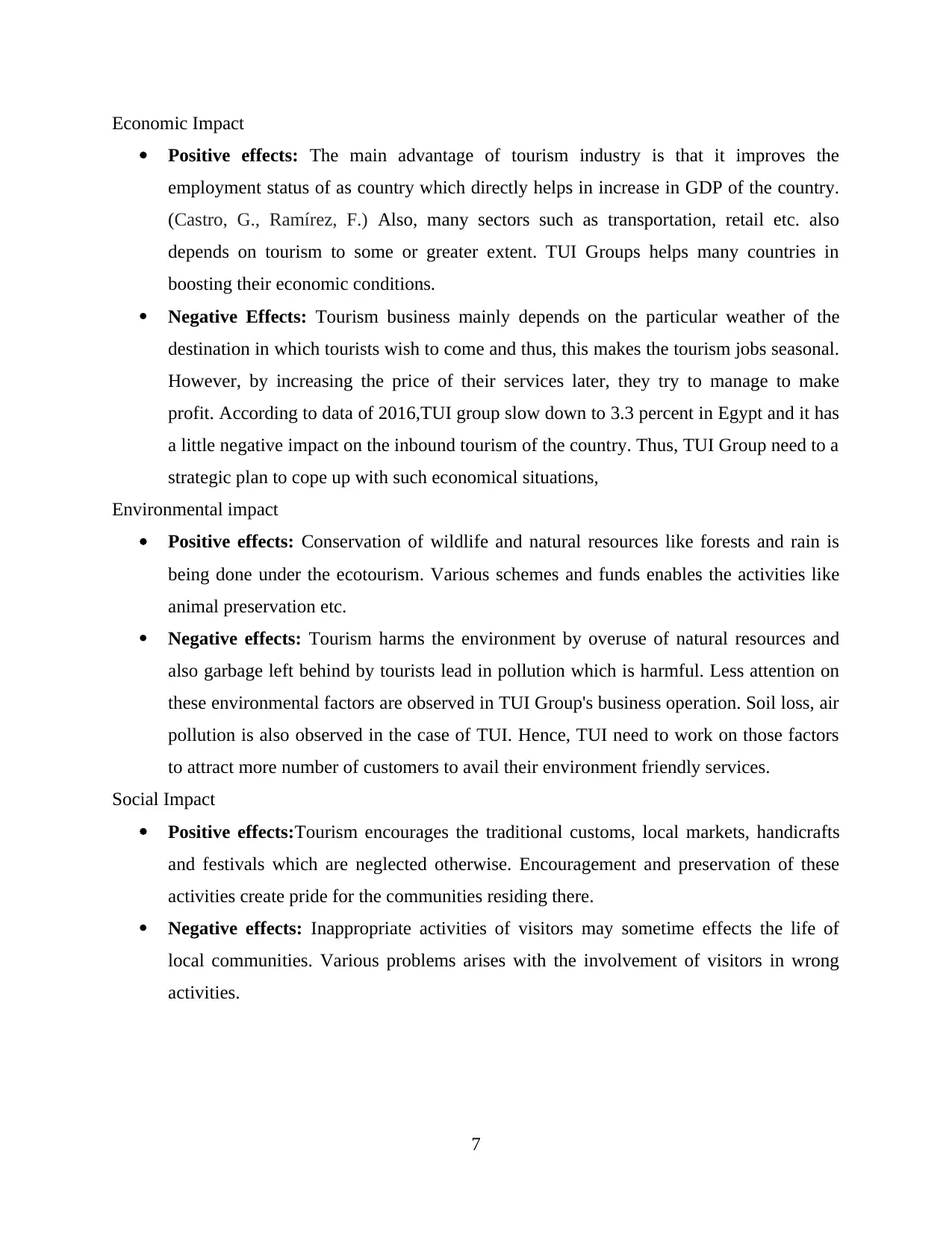
Economic Impact
Positive effects: The main advantage of tourism industry is that it improves the
employment status of as country which directly helps in increase in GDP of the country.
(Castro, G., Ramírez, F.) Also, many sectors such as transportation, retail etc. also
depends on tourism to some or greater extent. TUI Groups helps many countries in
boosting their economic conditions.
Negative Effects: Tourism business mainly depends on the particular weather of the
destination in which tourists wish to come and thus, this makes the tourism jobs seasonal.
However, by increasing the price of their services later, they try to manage to make
profit. According to data of 2016,TUI group slow down to 3.3 percent in Egypt and it has
a little negative impact on the inbound tourism of the country. Thus, TUI Group need to a
strategic plan to cope up with such economical situations,
Environmental impact
Positive effects: Conservation of wildlife and natural resources like forests and rain is
being done under the ecotourism. Various schemes and funds enables the activities like
animal preservation etc.
Negative effects: Tourism harms the environment by overuse of natural resources and
also garbage left behind by tourists lead in pollution which is harmful. Less attention on
these environmental factors are observed in TUI Group's business operation. Soil loss, air
pollution is also observed in the case of TUI. Hence, TUI need to work on those factors
to attract more number of customers to avail their environment friendly services.
Social Impact
Positive effects:Tourism encourages the traditional customs, local markets, handicrafts
and festivals which are neglected otherwise. Encouragement and preservation of these
activities create pride for the communities residing there.
Negative effects: Inappropriate activities of visitors may sometime effects the life of
local communities. Various problems arises with the involvement of visitors in wrong
activities.
7
Positive effects: The main advantage of tourism industry is that it improves the
employment status of as country which directly helps in increase in GDP of the country.
(Castro, G., Ramírez, F.) Also, many sectors such as transportation, retail etc. also
depends on tourism to some or greater extent. TUI Groups helps many countries in
boosting their economic conditions.
Negative Effects: Tourism business mainly depends on the particular weather of the
destination in which tourists wish to come and thus, this makes the tourism jobs seasonal.
However, by increasing the price of their services later, they try to manage to make
profit. According to data of 2016,TUI group slow down to 3.3 percent in Egypt and it has
a little negative impact on the inbound tourism of the country. Thus, TUI Group need to a
strategic plan to cope up with such economical situations,
Environmental impact
Positive effects: Conservation of wildlife and natural resources like forests and rain is
being done under the ecotourism. Various schemes and funds enables the activities like
animal preservation etc.
Negative effects: Tourism harms the environment by overuse of natural resources and
also garbage left behind by tourists lead in pollution which is harmful. Less attention on
these environmental factors are observed in TUI Group's business operation. Soil loss, air
pollution is also observed in the case of TUI. Hence, TUI need to work on those factors
to attract more number of customers to avail their environment friendly services.
Social Impact
Positive effects:Tourism encourages the traditional customs, local markets, handicrafts
and festivals which are neglected otherwise. Encouragement and preservation of these
activities create pride for the communities residing there.
Negative effects: Inappropriate activities of visitors may sometime effects the life of
local communities. Various problems arises with the involvement of visitors in wrong
activities.
7
You're viewing a preview
Unlock full access by subscribing today!
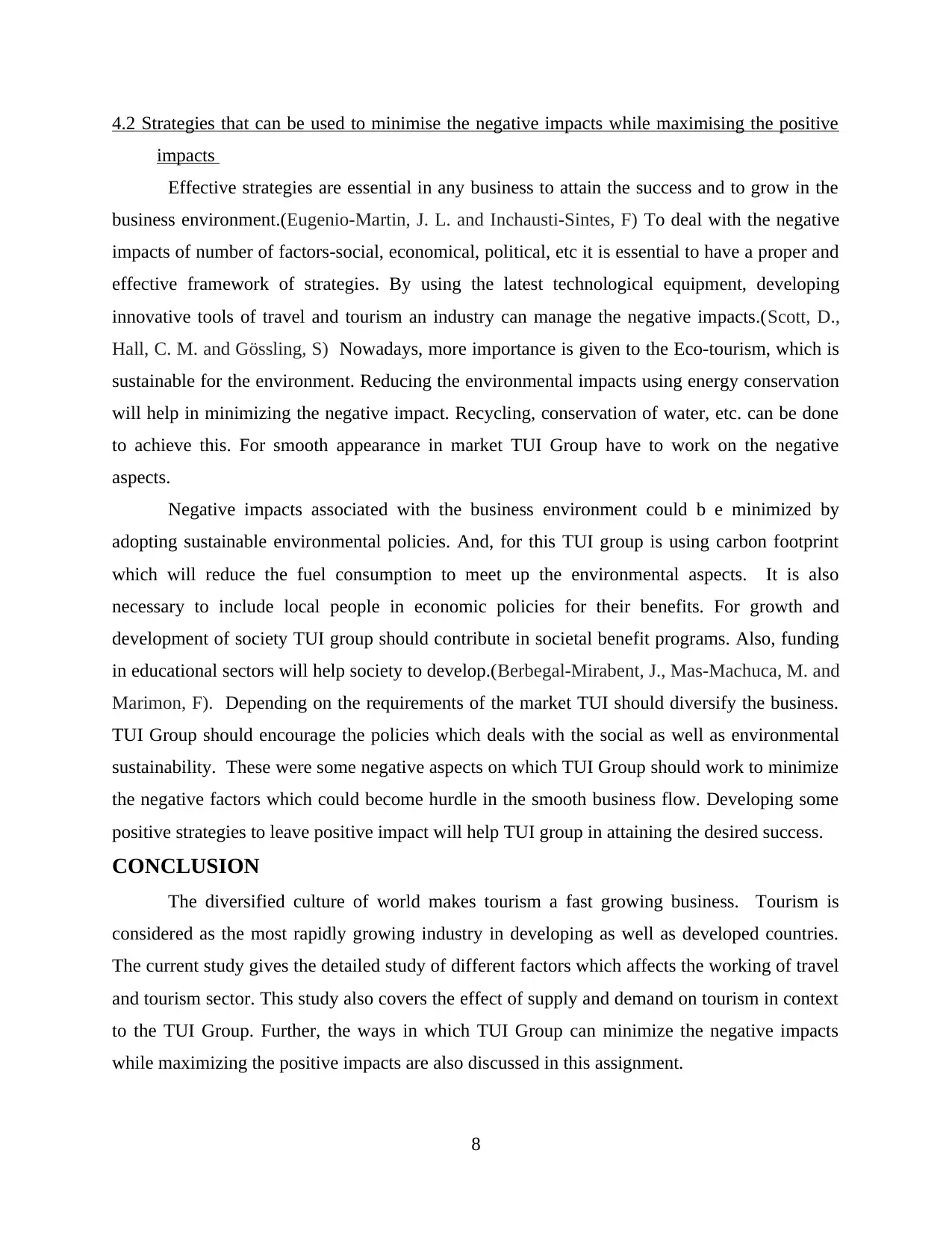
4.2 Strategies that can be used to minimise the negative impacts while maximising the positive
impacts
Effective strategies are essential in any business to attain the success and to grow in the
business environment.(Eugenio-Martin, J. L. and Inchausti-Sintes, F) To deal with the negative
impacts of number of factors-social, economical, political, etc it is essential to have a proper and
effective framework of strategies. By using the latest technological equipment, developing
innovative tools of travel and tourism an industry can manage the negative impacts.(Scott, D.,
Hall, C. M. and Gössling, S) Nowadays, more importance is given to the Eco-tourism, which is
sustainable for the environment. Reducing the environmental impacts using energy conservation
will help in minimizing the negative impact. Recycling, conservation of water, etc. can be done
to achieve this. For smooth appearance in market TUI Group have to work on the negative
aspects.
Negative impacts associated with the business environment could b e minimized by
adopting sustainable environmental policies. And, for this TUI group is using carbon footprint
which will reduce the fuel consumption to meet up the environmental aspects. It is also
necessary to include local people in economic policies for their benefits. For growth and
development of society TUI group should contribute in societal benefit programs. Also, funding
in educational sectors will help society to develop.(Berbegal-Mirabent, J., Mas-Machuca, M. and
Marimon, F). Depending on the requirements of the market TUI should diversify the business.
TUI Group should encourage the policies which deals with the social as well as environmental
sustainability. These were some negative aspects on which TUI Group should work to minimize
the negative factors which could become hurdle in the smooth business flow. Developing some
positive strategies to leave positive impact will help TUI group in attaining the desired success.
CONCLUSION
The diversified culture of world makes tourism a fast growing business. Tourism is
considered as the most rapidly growing industry in developing as well as developed countries.
The current study gives the detailed study of different factors which affects the working of travel
and tourism sector. This study also covers the effect of supply and demand on tourism in context
to the TUI Group. Further, the ways in which TUI Group can minimize the negative impacts
while maximizing the positive impacts are also discussed in this assignment.
8
impacts
Effective strategies are essential in any business to attain the success and to grow in the
business environment.(Eugenio-Martin, J. L. and Inchausti-Sintes, F) To deal with the negative
impacts of number of factors-social, economical, political, etc it is essential to have a proper and
effective framework of strategies. By using the latest technological equipment, developing
innovative tools of travel and tourism an industry can manage the negative impacts.(Scott, D.,
Hall, C. M. and Gössling, S) Nowadays, more importance is given to the Eco-tourism, which is
sustainable for the environment. Reducing the environmental impacts using energy conservation
will help in minimizing the negative impact. Recycling, conservation of water, etc. can be done
to achieve this. For smooth appearance in market TUI Group have to work on the negative
aspects.
Negative impacts associated with the business environment could b e minimized by
adopting sustainable environmental policies. And, for this TUI group is using carbon footprint
which will reduce the fuel consumption to meet up the environmental aspects. It is also
necessary to include local people in economic policies for their benefits. For growth and
development of society TUI group should contribute in societal benefit programs. Also, funding
in educational sectors will help society to develop.(Berbegal-Mirabent, J., Mas-Machuca, M. and
Marimon, F). Depending on the requirements of the market TUI should diversify the business.
TUI Group should encourage the policies which deals with the social as well as environmental
sustainability. These were some negative aspects on which TUI Group should work to minimize
the negative factors which could become hurdle in the smooth business flow. Developing some
positive strategies to leave positive impact will help TUI group in attaining the desired success.
CONCLUSION
The diversified culture of world makes tourism a fast growing business. Tourism is
considered as the most rapidly growing industry in developing as well as developed countries.
The current study gives the detailed study of different factors which affects the working of travel
and tourism sector. This study also covers the effect of supply and demand on tourism in context
to the TUI Group. Further, the ways in which TUI Group can minimize the negative impacts
while maximizing the positive impacts are also discussed in this assignment.
8
Paraphrase This Document
Need a fresh take? Get an instant paraphrase of this document with our AI Paraphraser
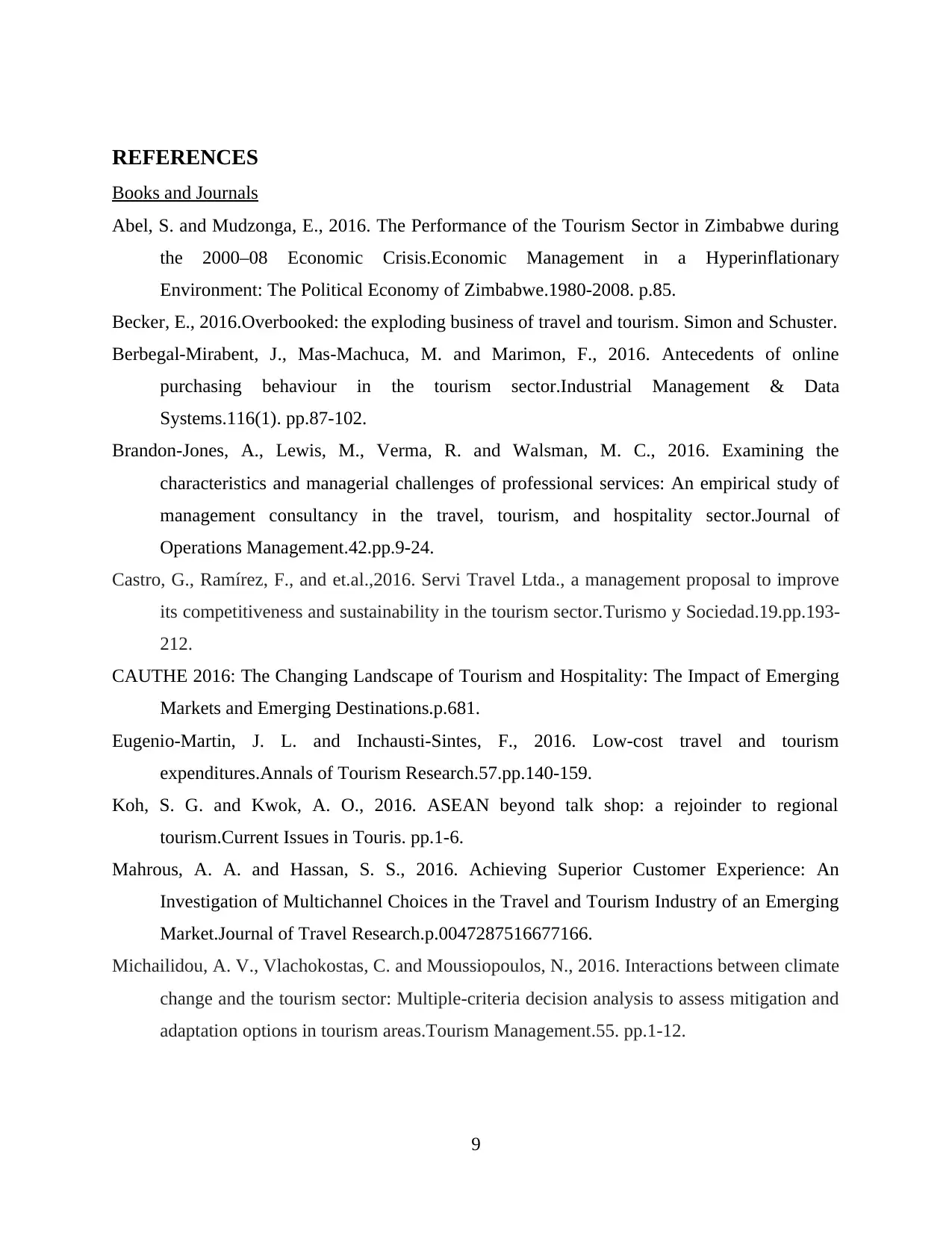
REFERENCES
Books and Journals
Abel, S. and Mudzonga, E., 2016. The Performance of the Tourism Sector in Zimbabwe during
the 2000–08 Economic Crisis.Economic Management in a Hyperinflationary
Environment: The Political Economy of Zimbabwe.1980-2008. p.85.
Becker, E., 2016.Overbooked: the exploding business of travel and tourism. Simon and Schuster.
Berbegal-Mirabent, J., Mas-Machuca, M. and Marimon, F., 2016. Antecedents of online
purchasing behaviour in the tourism sector.Industrial Management & Data
Systems.116(1). pp.87-102.
Brandon-Jones, A., Lewis, M., Verma, R. and Walsman, M. C., 2016. Examining the
characteristics and managerial challenges of professional services: An empirical study of
management consultancy in the travel, tourism, and hospitality sector.Journal of
Operations Management.42.pp.9-24.
Castro, G., Ramírez, F., and et.al.,2016. Servi Travel Ltda., a management proposal to improve
its competitiveness and sustainability in the tourism sector.Turismo y Sociedad.19.pp.193-
212.
CAUTHE 2016: The Changing Landscape of Tourism and Hospitality: The Impact of Emerging
Markets and Emerging Destinations.p.681.
Eugenio-Martin, J. L. and Inchausti-Sintes, F., 2016. Low-cost travel and tourism
expenditures.Annals of Tourism Research.57.pp.140-159.
Koh, S. G. and Kwok, A. O., 2016. ASEAN beyond talk shop: a rejoinder to regional
tourism.Current Issues in Touris. pp.1-6.
Mahrous, A. A. and Hassan, S. S., 2016. Achieving Superior Customer Experience: An
Investigation of Multichannel Choices in the Travel and Tourism Industry of an Emerging
Market.Journal of Travel Research.p.0047287516677166.
Michailidou, A. V., Vlachokostas, C. and Moussiopoulos, Ν., 2016. Interactions between climate
change and the tourism sector: Multiple-criteria decision analysis to assess mitigation and
adaptation options in tourism areas.Tourism Management.55. pp.1-12.
9
Books and Journals
Abel, S. and Mudzonga, E., 2016. The Performance of the Tourism Sector in Zimbabwe during
the 2000–08 Economic Crisis.Economic Management in a Hyperinflationary
Environment: The Political Economy of Zimbabwe.1980-2008. p.85.
Becker, E., 2016.Overbooked: the exploding business of travel and tourism. Simon and Schuster.
Berbegal-Mirabent, J., Mas-Machuca, M. and Marimon, F., 2016. Antecedents of online
purchasing behaviour in the tourism sector.Industrial Management & Data
Systems.116(1). pp.87-102.
Brandon-Jones, A., Lewis, M., Verma, R. and Walsman, M. C., 2016. Examining the
characteristics and managerial challenges of professional services: An empirical study of
management consultancy in the travel, tourism, and hospitality sector.Journal of
Operations Management.42.pp.9-24.
Castro, G., Ramírez, F., and et.al.,2016. Servi Travel Ltda., a management proposal to improve
its competitiveness and sustainability in the tourism sector.Turismo y Sociedad.19.pp.193-
212.
CAUTHE 2016: The Changing Landscape of Tourism and Hospitality: The Impact of Emerging
Markets and Emerging Destinations.p.681.
Eugenio-Martin, J. L. and Inchausti-Sintes, F., 2016. Low-cost travel and tourism
expenditures.Annals of Tourism Research.57.pp.140-159.
Koh, S. G. and Kwok, A. O., 2016. ASEAN beyond talk shop: a rejoinder to regional
tourism.Current Issues in Touris. pp.1-6.
Mahrous, A. A. and Hassan, S. S., 2016. Achieving Superior Customer Experience: An
Investigation of Multichannel Choices in the Travel and Tourism Industry of an Emerging
Market.Journal of Travel Research.p.0047287516677166.
Michailidou, A. V., Vlachokostas, C. and Moussiopoulos, Ν., 2016. Interactions between climate
change and the tourism sector: Multiple-criteria decision analysis to assess mitigation and
adaptation options in tourism areas.Tourism Management.55. pp.1-12.
9
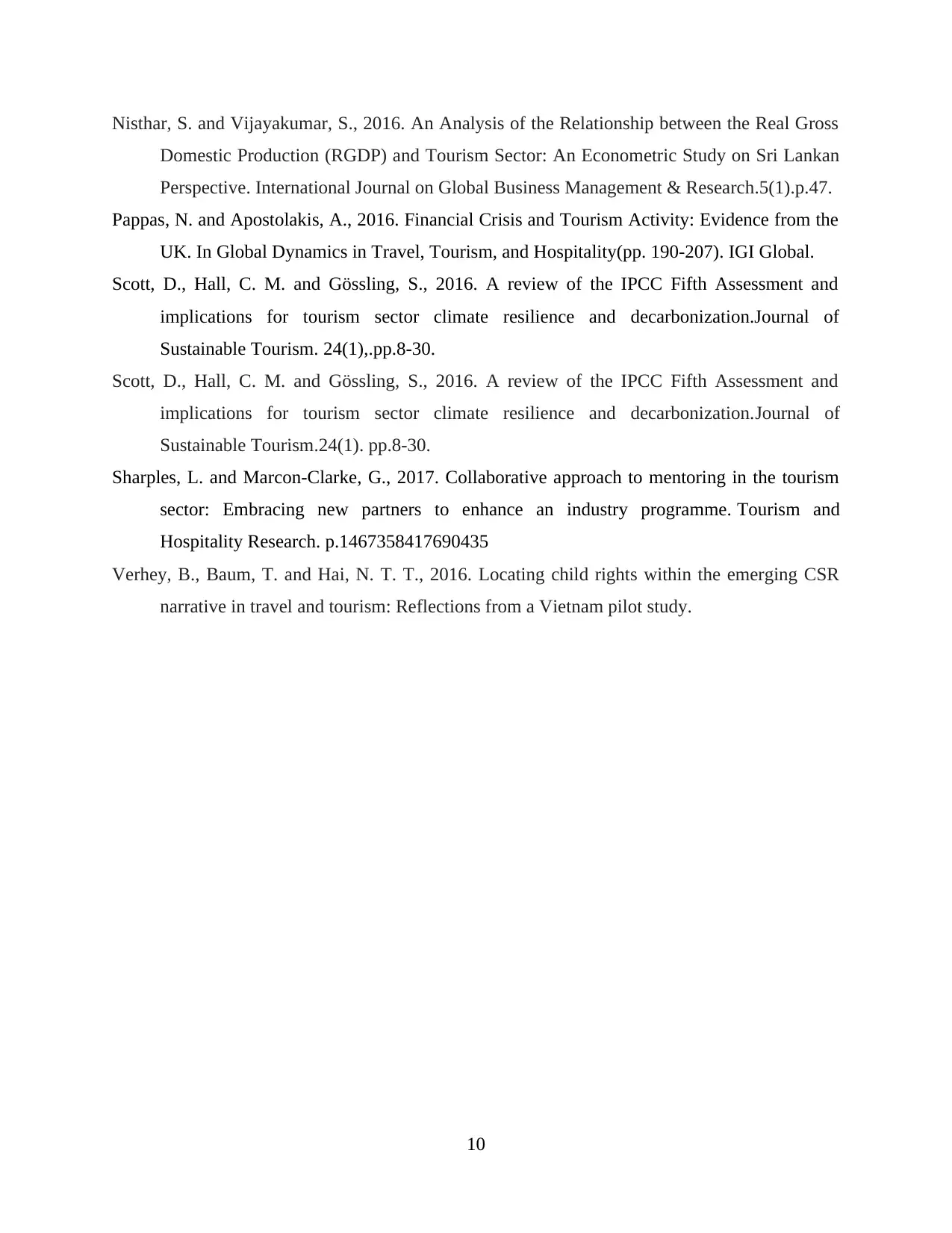
Nisthar, S. and Vijayakumar, S., 2016. An Analysis of the Relationship between the Real Gross
Domestic Production (RGDP) and Tourism Sector: An Econometric Study on Sri Lankan
Perspective. International Journal on Global Business Management & Research.5(1).p.47.
Pappas, N. and Apostolakis, A., 2016. Financial Crisis and Tourism Activity: Evidence from the
UK. In Global Dynamics in Travel, Tourism, and Hospitality(pp. 190-207). IGI Global.
Scott, D., Hall, C. M. and Gössling, S., 2016. A review of the IPCC Fifth Assessment and
implications for tourism sector climate resilience and decarbonization.Journal of
Sustainable Tourism. 24(1),.pp.8-30.
Scott, D., Hall, C. M. and Gössling, S., 2016. A review of the IPCC Fifth Assessment and
implications for tourism sector climate resilience and decarbonization.Journal of
Sustainable Tourism.24(1). pp.8-30.
Sharples, L. and Marcon-Clarke, G., 2017. Collaborative approach to mentoring in the tourism
sector: Embracing new partners to enhance an industry programme. Tourism and
Hospitality Research. p.1467358417690435
Verhey, B., Baum, T. and Hai, N. T. T., 2016. Locating child rights within the emerging CSR
narrative in travel and tourism: Reflections from a Vietnam pilot study.
10
Domestic Production (RGDP) and Tourism Sector: An Econometric Study on Sri Lankan
Perspective. International Journal on Global Business Management & Research.5(1).p.47.
Pappas, N. and Apostolakis, A., 2016. Financial Crisis and Tourism Activity: Evidence from the
UK. In Global Dynamics in Travel, Tourism, and Hospitality(pp. 190-207). IGI Global.
Scott, D., Hall, C. M. and Gössling, S., 2016. A review of the IPCC Fifth Assessment and
implications for tourism sector climate resilience and decarbonization.Journal of
Sustainable Tourism. 24(1),.pp.8-30.
Scott, D., Hall, C. M. and Gössling, S., 2016. A review of the IPCC Fifth Assessment and
implications for tourism sector climate resilience and decarbonization.Journal of
Sustainable Tourism.24(1). pp.8-30.
Sharples, L. and Marcon-Clarke, G., 2017. Collaborative approach to mentoring in the tourism
sector: Embracing new partners to enhance an industry programme. Tourism and
Hospitality Research. p.1467358417690435
Verhey, B., Baum, T. and Hai, N. T. T., 2016. Locating child rights within the emerging CSR
narrative in travel and tourism: Reflections from a Vietnam pilot study.
10
You're viewing a preview
Unlock full access by subscribing today!
1 out of 12
Related Documents
Your All-in-One AI-Powered Toolkit for Academic Success.
+13062052269
info@desklib.com
Available 24*7 on WhatsApp / Email
![[object Object]](/_next/static/media/star-bottom.7253800d.svg)
Unlock your academic potential
© 2024 | Zucol Services PVT LTD | All rights reserved.





